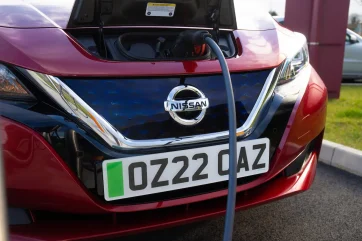
A meeting between the UK Government and motoring industry representatives on EV sales targets has been followed by a call for change from Nissan.
Transport Secretary Louise Haigh and Business and Trade Secretary Jonathan Reynolds hosted a roundtable with industry leaders to discuss the transition to electric vehicles, and the ZEV mandate, which requires carmakers to sell an increasing proportion of EVs each year or face financial penalties.
Following the meeting, the government said it was committed to reinstating a 2030 phase-out date for cars solely powered by internal combustion engines, and highlighted flexibilities built into the ZEV mandate, including options to defer some sales to then ‘catch up’ in future years, and trade sales between manufacturers.
A government spokesperson said: “Recognising the global challenges the industry has been facing, ministers underlined the government’s commitment to working constructively and in close partnership with the sector as we support the transition to electric vehicles by 2030.”
In its own statement following the meeting, Nissan said ‘urgent action’ was needed to stop carmakers being penalised due to slowing consumer demand for EVs.
Nissan chairperson for the AMIEO region Guillaume Cartier said: “Nissan has consistently supported the aims of the UK’s ZEV mandate and has been working with governments and partners towards a fully electric future since the first Nissan Leaf arrived in 2010.
“The mandate risks undermining the business case for manufacturing cars in the UK, and the viability of thousands of jobs and billions of pounds in investment. We now need to see urgent action from the government by the end of the year to avoid a potentially irreversible impact on the UK automotive sector.”
Society of Motor Manufacturers and Traders (SMMT) chief executive Mike Hawes said: “Today’s discussion with ministers was an important opportunity to restate the UK automotive industry’s commitment to both economic growth and net zero. However, the industry also made clear its concerns about the pace of the EV transition and the negative effect this is having on the health of the overall market and the attractiveness of the UK as a manufacturing location.
“A strong market and manufacturing base that sustains jobs and drives growth requires workable regulation backed by support for consumers – fiscal incentives and confidence that the charging network will be there when it is needed.
“We will now work urgently with government to identify any adjustments necessary to help the industry and government meet their targets, instilling confidence in the consumer and other stakeholders, all of whom are part of this transition.”
Octopus Electric Vehicles CEO Fiona Howarth, who also took part in the meeting, said: “The ZEV mandate is doing what it was intended to do, and tampering with it risks undermining investment in a massive growth industry.
“Demand for EVs is rising, not just in the UK but globally. Every second driver in the UK today wants an EV, and we need to ensure we can deliver them.
“Whatever mechanisms are considered to support UK employers during a transitioning market must not impact the legislation that investors rely on. Legislation must be bankable to deliver a key government objective to crowd in private investment.”
Vicky Read, CEO of charging industry body ChargeUK, said: “The charging industry is a UK growth story, we are delivering the vital infrastructure necessary for the EV transition at pace and scale.
“ChargeUK members are putting a new charge point in the ground every 25 minutes on average, and they are committed to invest over £6 billion up to 2030 ensuring we stay ahead of demand.
“That progress – building an entire industry practically from scratch over 10 years – was acknowledged by government this afternoon and everyone is agreed that uncertainty is the enemy of the EV transition and threatens investment on all sides.
“We will study the forthcoming consultation closely and continue to make the case to retain what we already have – a strong ZEV mandate that works.”





